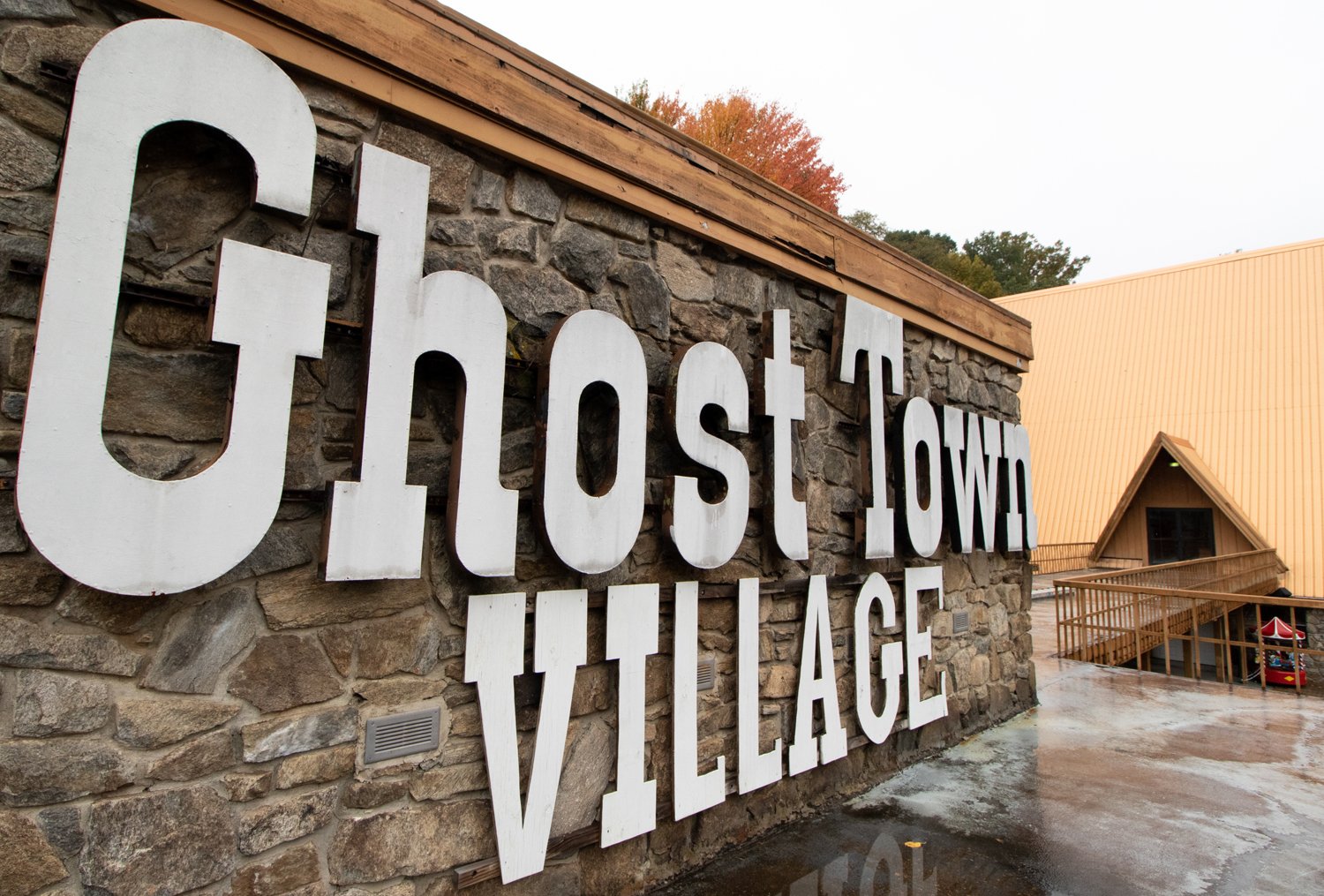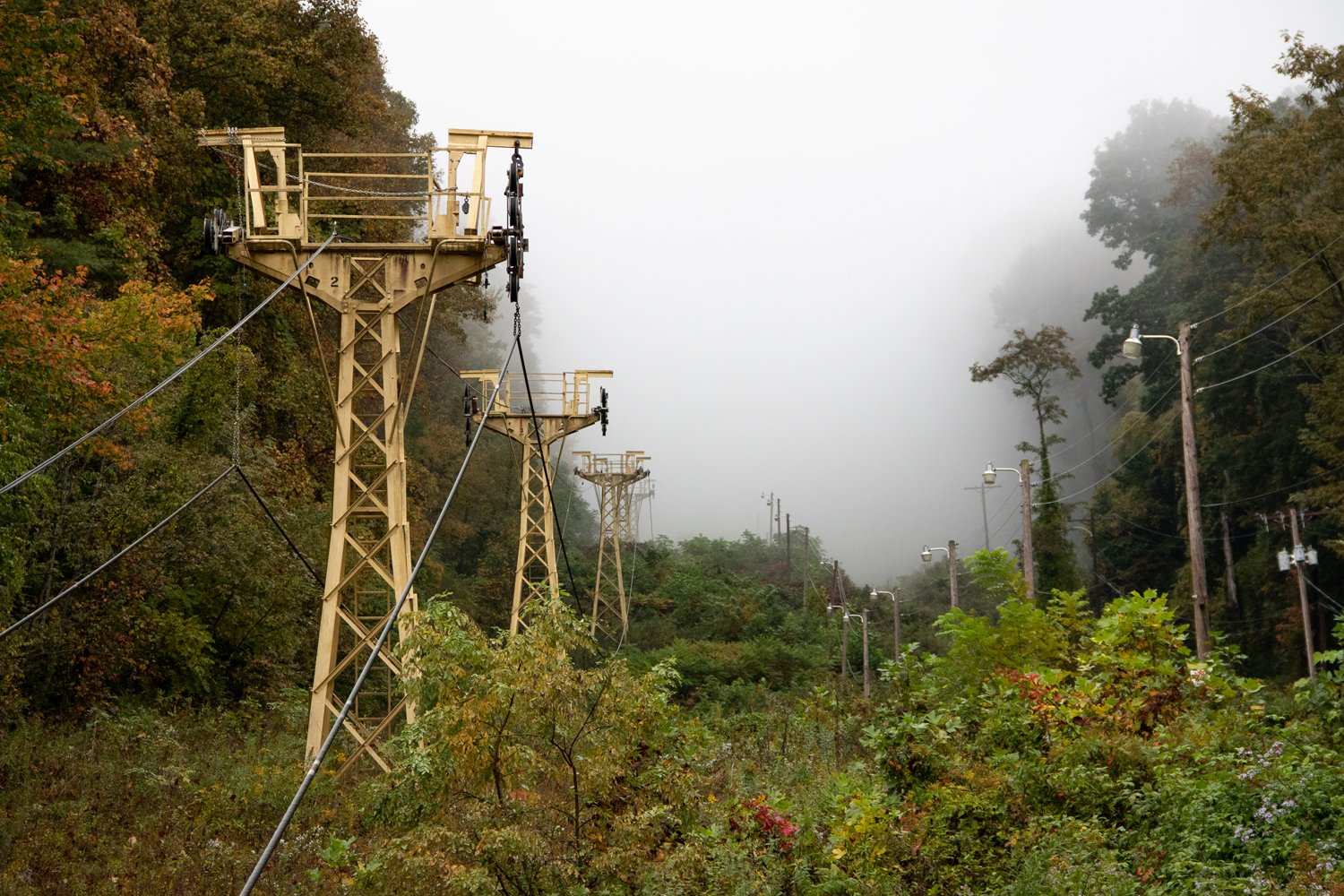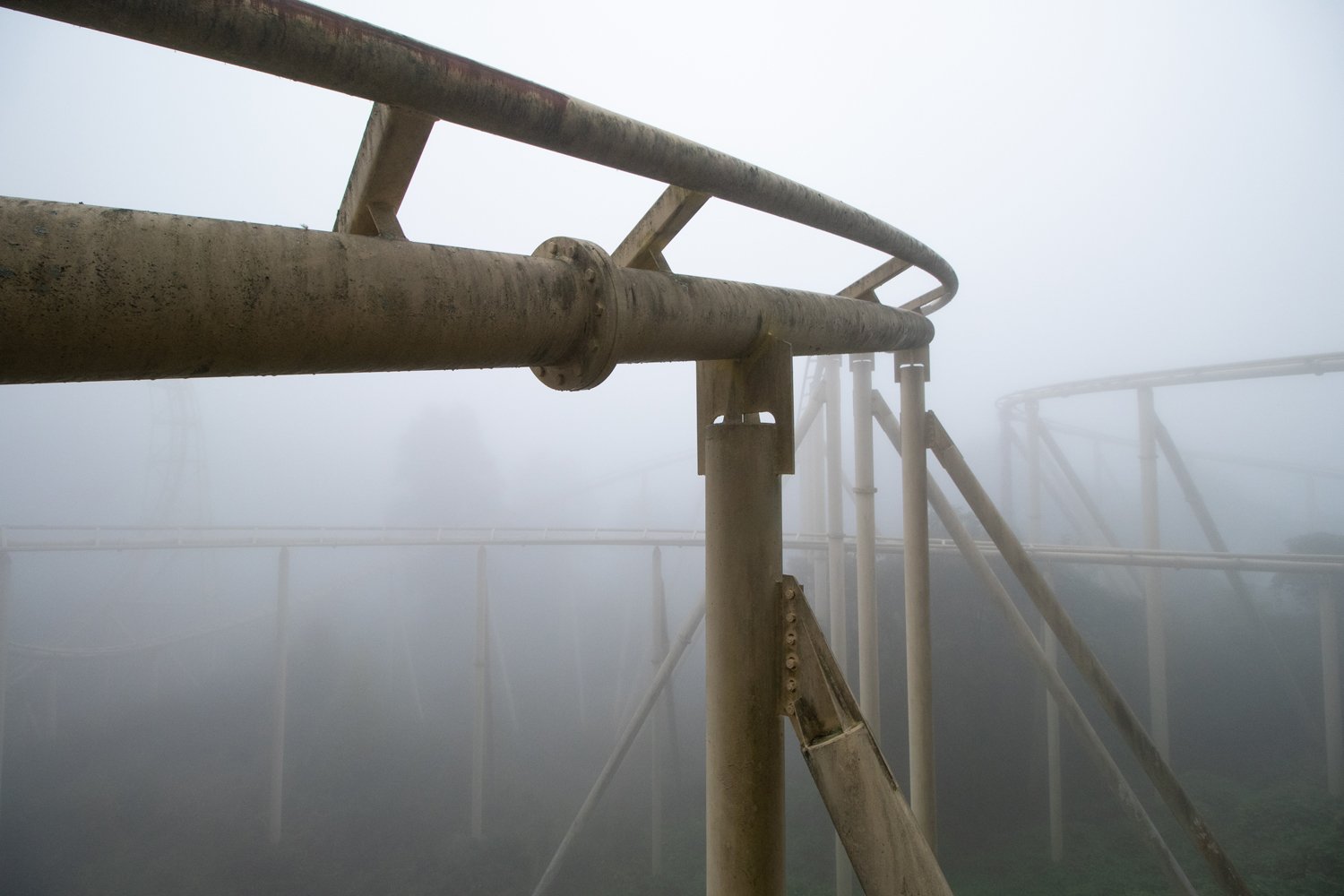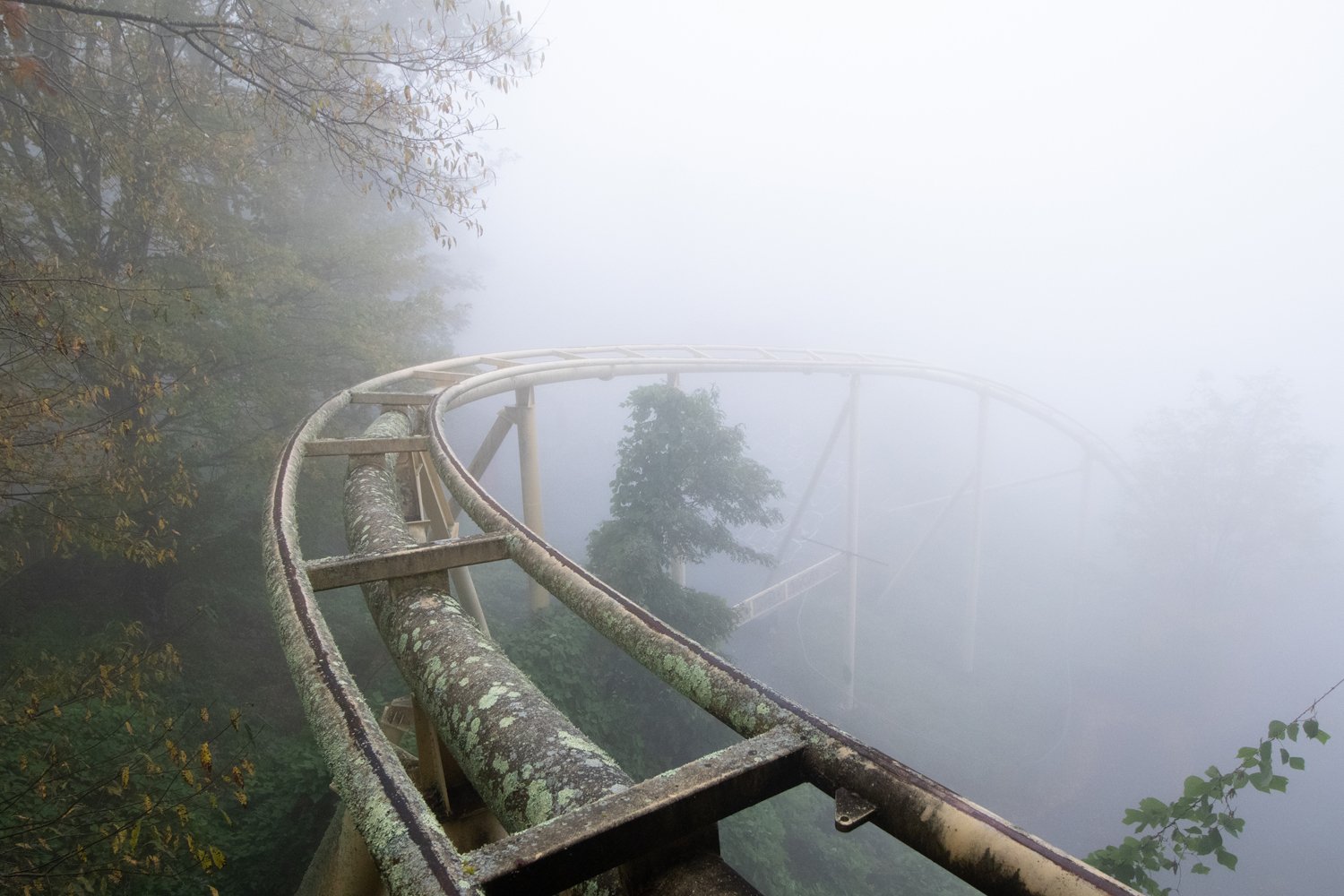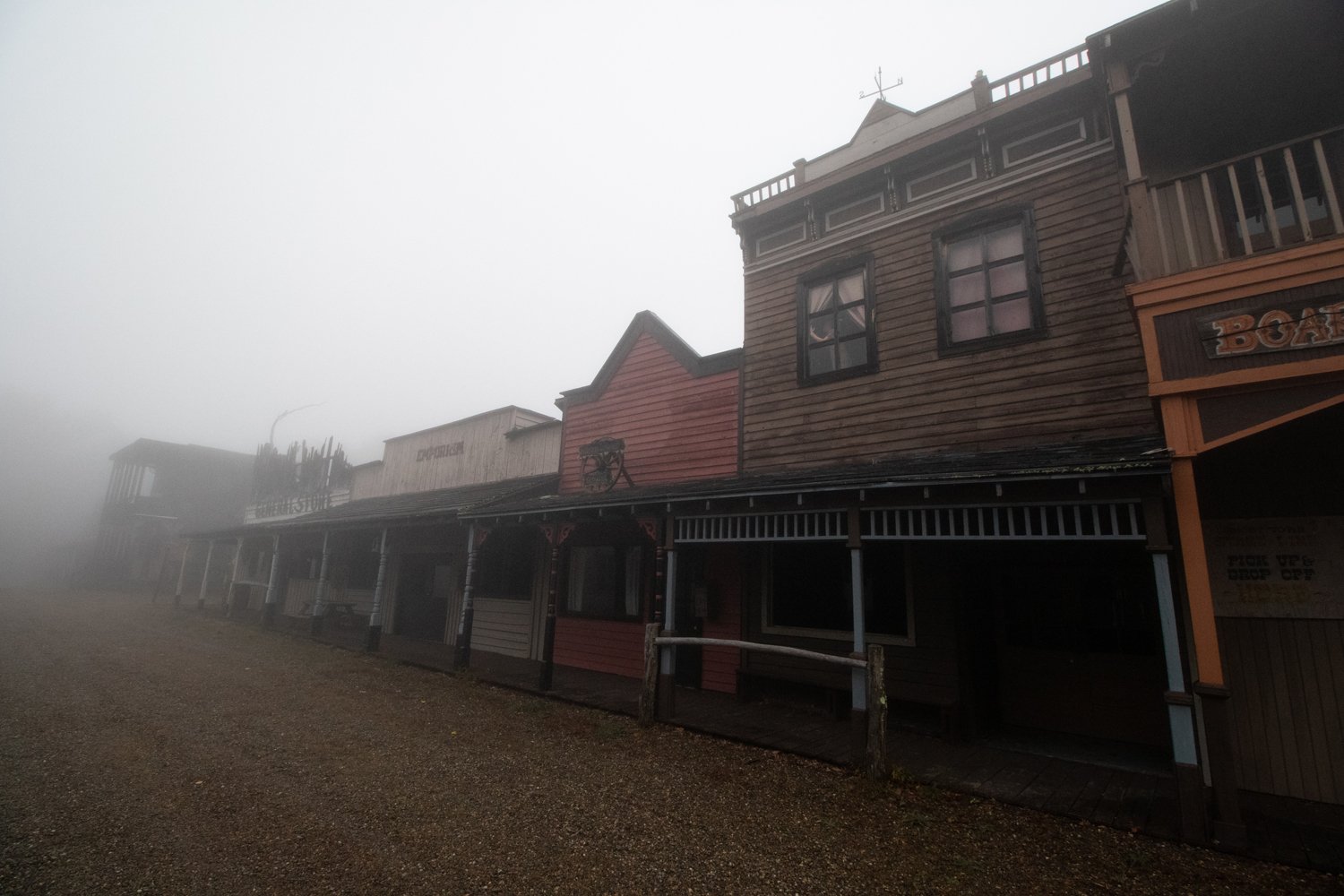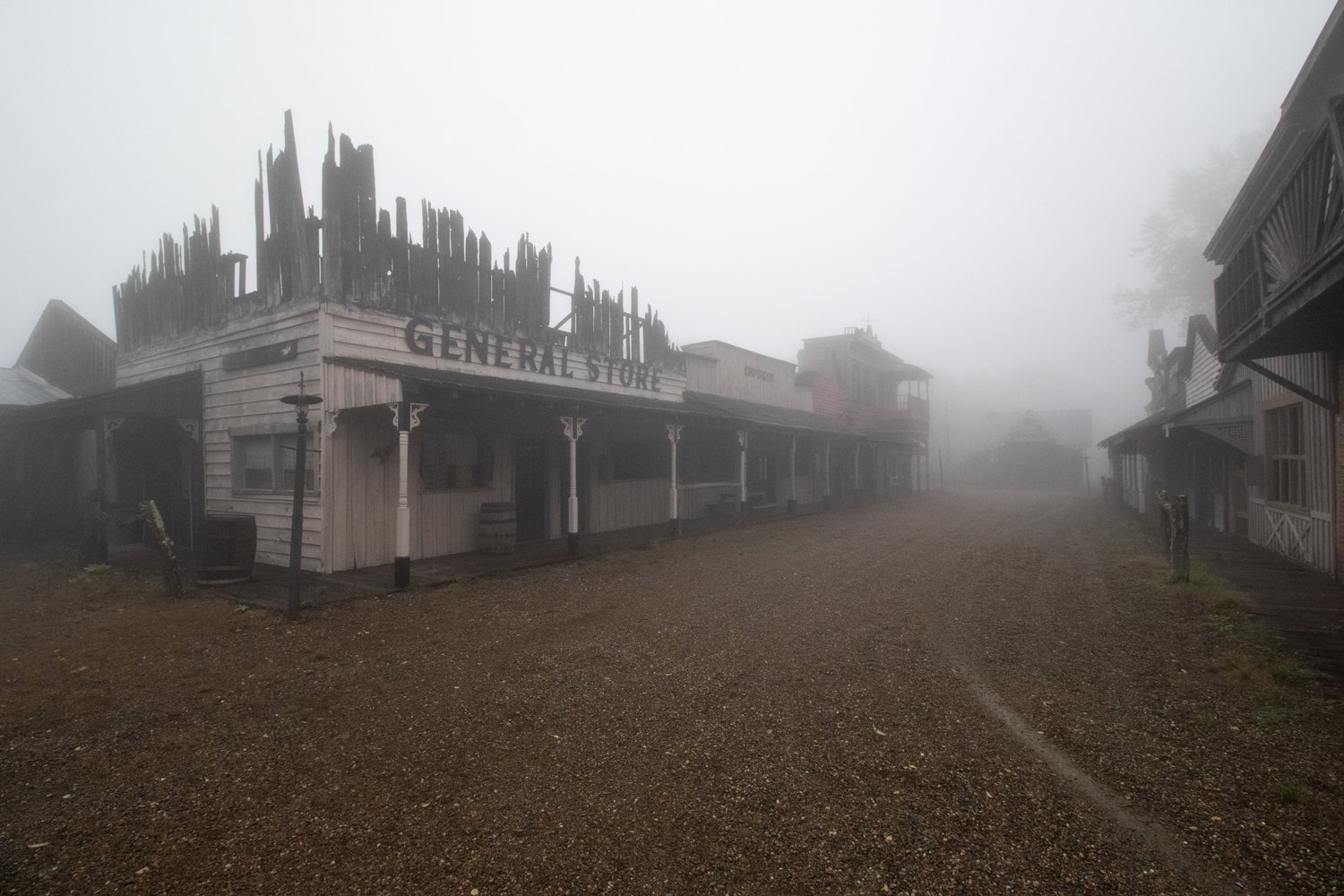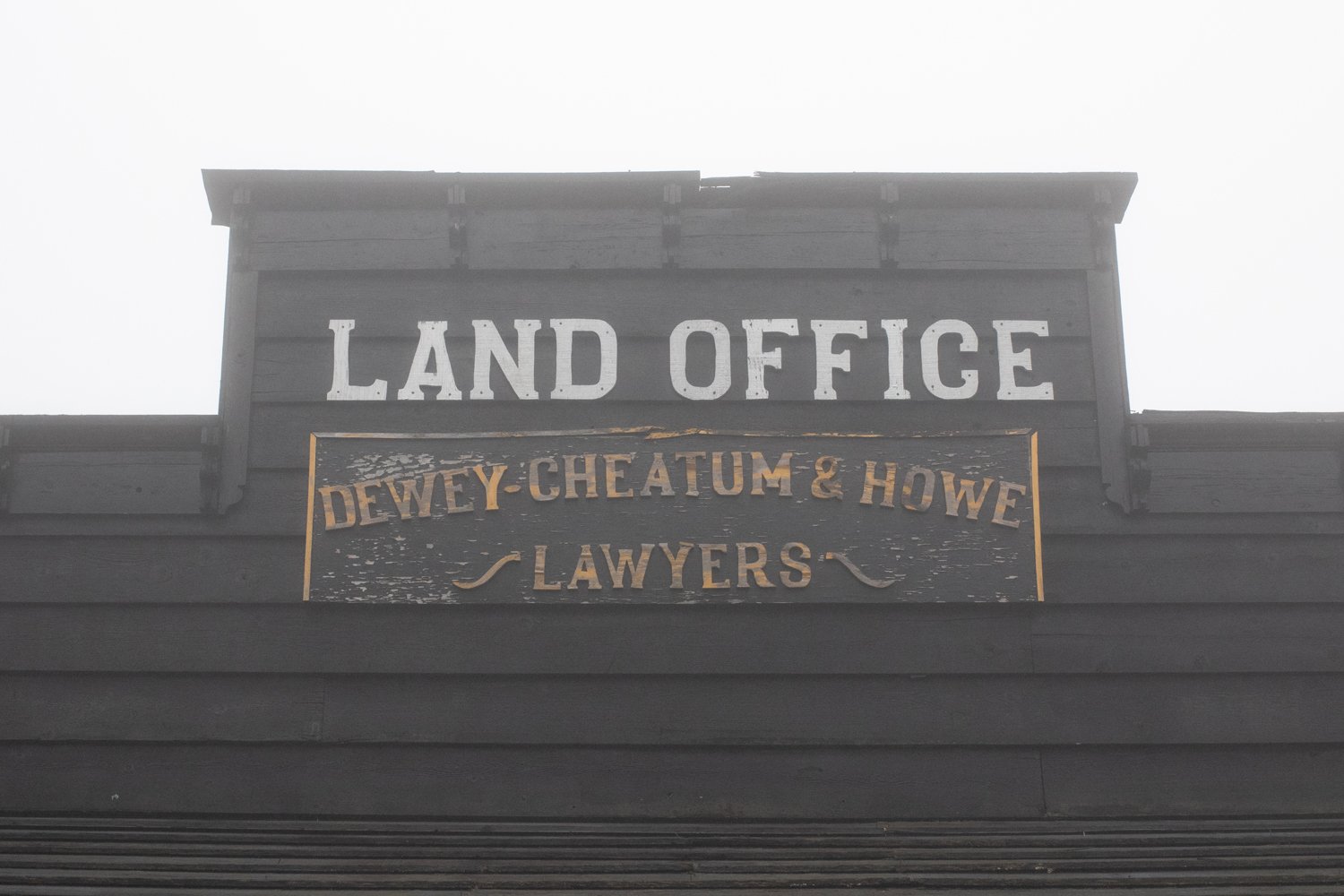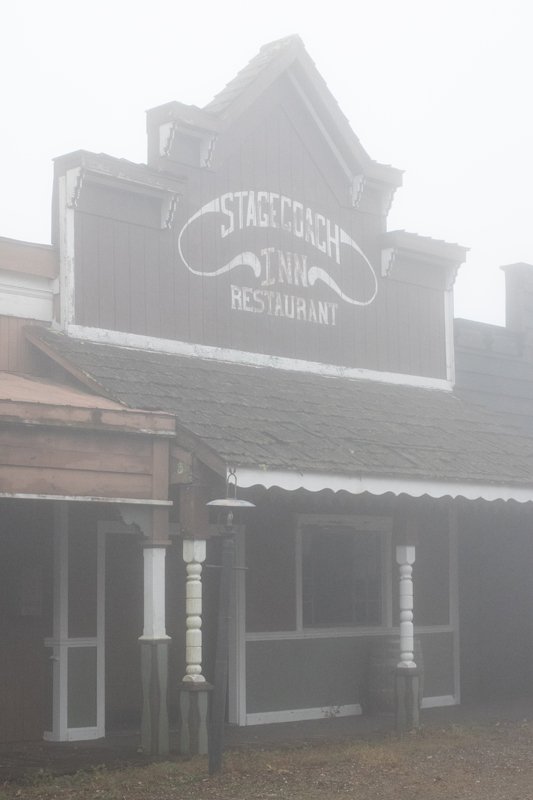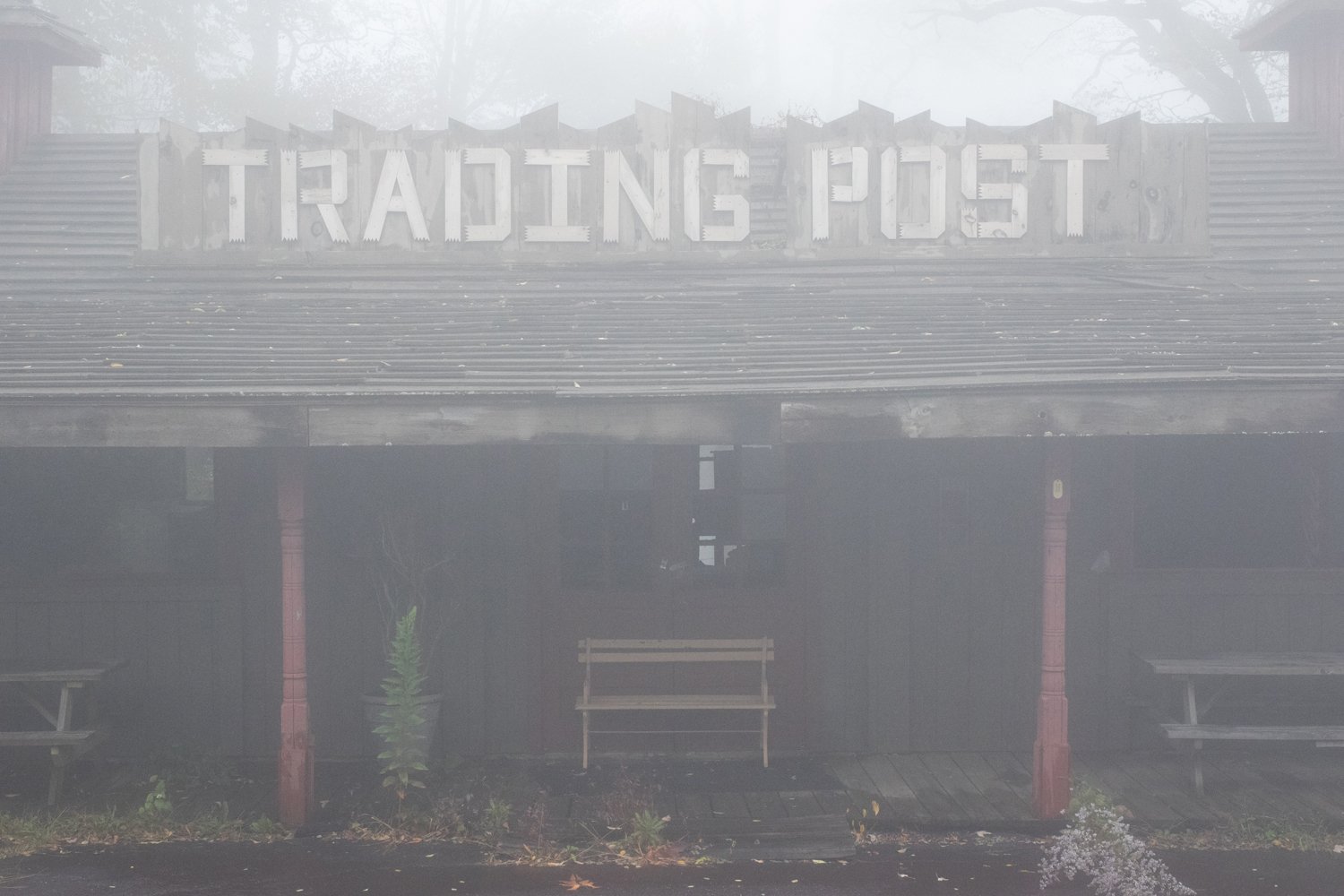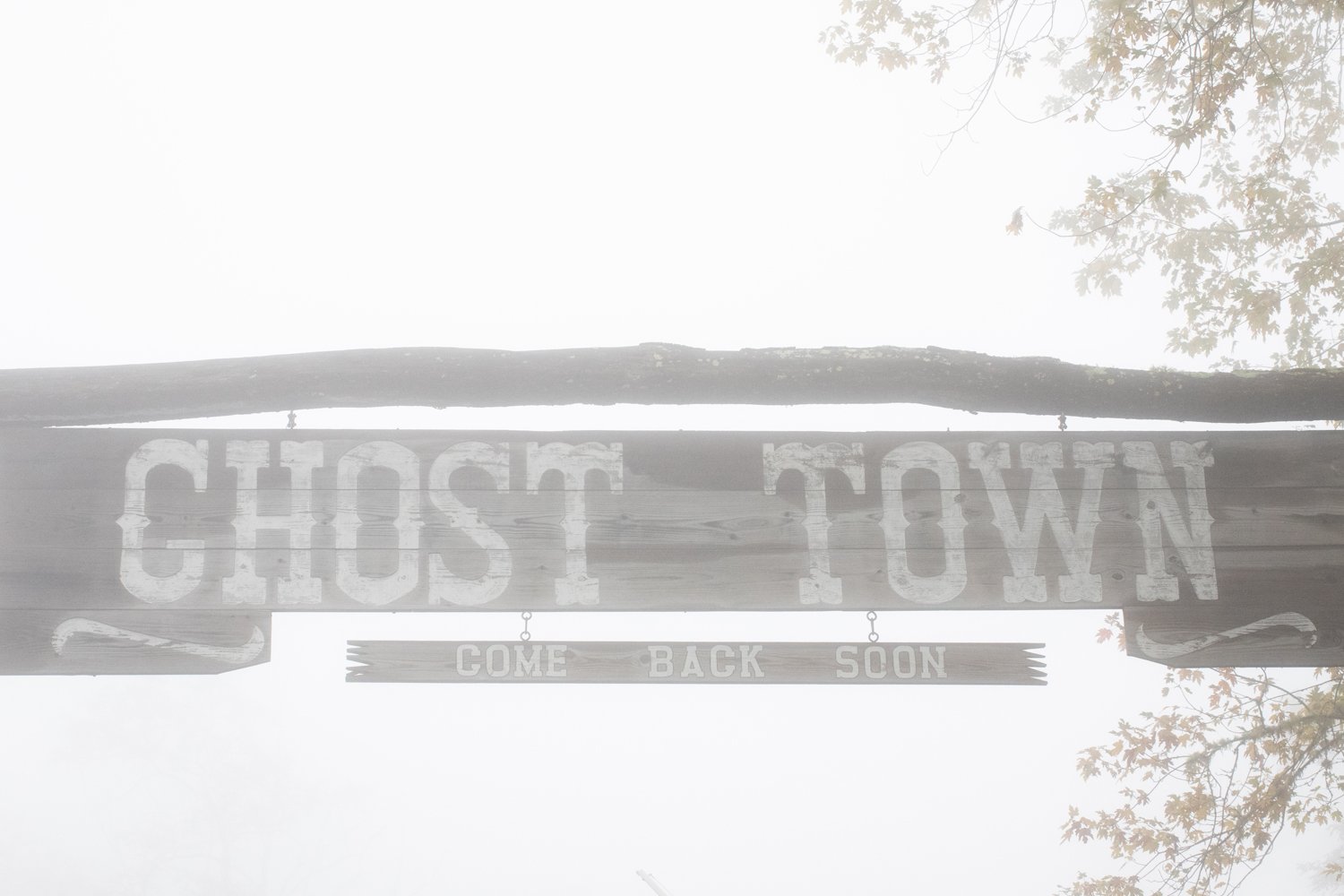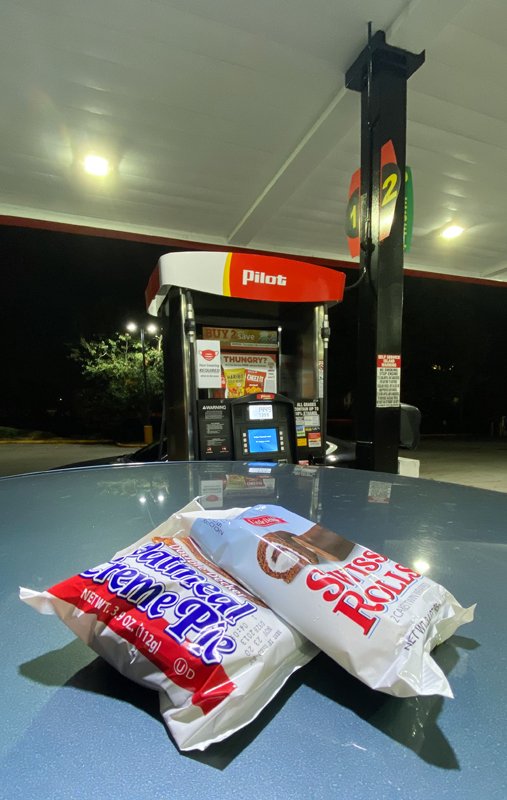Coming to Grips in a Ghost Town
Here they come again. Maybe this time they’re from laughing. Patton Oswalt isn’t my favorite comedian, but this bit about hearing Toto’s “Africa” on supermarket speakers while mindlessly shopping for frozen dinners has struck a melancholic chord. “Lean Cuisine suicide” is what I write in the notebook. These are definitely tears of grief, though. Glimpsing the skyline up ahead confirms that. This isn’t where I’m supposed to be, even if it’s technically home. As I press the accelerator, plastic crunches beneath my feet—remnants of gas station snacks from several exits back. Substitutes for wedding cake.
• • •
Western films were experiencing a resurgence in the mid-20th century. Stories of gunslingers traversing an untamed frontier, toiling against lawlessness and problematic depictions of Native Americans—it all represented the mythos of grit, determination, and heroism. Amusement park veteran R.B. Coburn, inspired by his travels to the American west and capitalizing on the popular cinema genre of the time, set out to build a destination atop Buck Mountain in Maggie Valley, North Carolina.
Ghost Town in the Sky postcard. Via Trripadvisor.
His attraction featured an expansive, replica frontier town which served as the backdrop for staged shootouts and saloon singalongs. To access the park at the mountain’s peak, a funicular railway was constructed. Guests would arrive at the gift shop alongside US 19 and board the incline, riding tiered seats to the western world above.
Undated image of Ghost Town in the Sky’s funicular railway. Via Funimag.
Eventually, a chair lift was also added to accommodate the growing crowds looking to ascend an often fog draped mountain. “Ghost Town in the Sky” quickly became one of North Carolina’s top tourism draws, a place designed in the finest traditions of roadside attractions and mid-century amusement parks.
• • •
Every spot has a line stretched out onto the sidewalk. I keeping thinking that I’d love to find a communal table or barstool where alcohol induced courage might convince me to reach out for conversation, but I’m only kidding myself. The various groups of bachelor/bachelorette parties seem well within their own worlds anyways. The drinks are good, but “local brewery IPA” seems to taste as generic as “Bud” or “Miller” these days. Using a tree to dodge the rain on this bar patio, I host an internal debate: look at my phone or write? Even when I’m fully aware that I’m distracting myself, I keep distracting myself—ignoring my notebook as I scroll through Twitter and Instagram to once again check who’s still following.
“Why the hell am I here anyways?” That’s what I keep repeating in my head. I remember the rationalization for stopping in Asheville, North Carolina: the Air BNB was a steal, I’m close to where I need to be tomorrow, and the nightlife is an alternative to floundering alone in a motel room with pizza and cable television. Part of me truly wanted to experience this city, but I wonder if I’m just indulging in the construction of a narrative at this point—one that technically began in 2005.
It was from then until 2012 that I’d spent much of my youth working at Kings Island, an amusement park north of Cincinnati. I’d managed ride operations and done some light maintenance work, but those tasks don’t even begin to brush the surface of what all those years encompassed. I loved that job and it affected me deeply. K.I. produced confidence, value, loss, trauma, and meaning. It also taught me to carry a notebook.
The last note I ever wrote on the job? Probably something about a particular second-hand, piece of shit ride that was always breaking down. Nick would need to know about it and I’d relay my notes to him over a smoke break by the security garage, dictating handwritten details of the day between breaths of a bad habit. Over time, though, my notebooks transcended simple shift details. It was within one of those spiral bound pads (wrapped in duct tape to keep the sweat from cheap, uniform-issue khaki pants at bay) where I first recorded the idea for a book.
Back then, I wasn’t exactly sure how I’d bring it all together, but the premise was scribbled atop a diner counter after a sleepless night—etched in ink on coffee stained pages and written with the kind of enthusiasm that’s fueled by impending exhaustion. The publication would cross recollections of the years I’d spent working at K.I. with the other side of my life: the times I’d spent exploring, photographing, and documenting abandoned places, specifically abandoned amusement parks. As the years wore on well past the end of my K.I. career, they too became part of the larger story. When I was working on those drafts, it was difficult to not feel like the trope of a high school quarterback who was this close to “winning that big game,” still telling the story to anyone in earshot over pints of Michelob at some shitty strip mall bar. That time in my life can be very hard to articulate to those who haven’t experienced some version of it themselves. Then one day, I had my ending. I had resolve. I had a resolution. I was done with the whole story.
But I’m here in Asheville now. Still using a notebook and trying to piece together where I go from here—forced to amend the ending of that book. Being in the millennial bachelor party capitol of the East Coast offers both practicality and literary irony. Even if I had gotten as far as having a bachelor party, this wasn’t going to be the spot anyways. Nick would’ve picked something else, he knows me better than anyone. I had been his best man, he teared up when I asked him to be mine. He and his wife Kelly, they’re more than best friends, they’re family. We’d all met at K.I. years ago. Now I wonder if I should text them to check in, let them know how I’m doing. They’re two of only a few people who know where I’m at—both physically and mentally.
No, I need to be present here. No matter how odd, uncomfortable, or surreal everything still seems. So I sit and stare, occasionally looking down at the notebook and scribbling in it. The whole scene wears on me, though: rain splattered wooden tables where groups raise their drinks and clink glasses over a chorus of laughter, bathed in the light of a projection screen showing music videos. This bar is like the party deck of an inland cruise ship for drunk, young people that seem to have their lives together in a way I never quite have. Like many times before, I’ve convinced myself that I don’t “get it.” That this isn’t my place. That these aren’t my people. So I retreat back to my rented accommodations—forcing myself to sleep, repeating that tomorrow may not be better.
But at least it’ll be something.
• • •
Ghost Town in the Sky would be challenged by the growth of the interstate and the rise of other Smoky Mountain tourist attractions, but the park remained as a beloved, local mainstay. Coburn would sell off the operation, but eventually reclaimed ownership in 1986—renewing his commitment by adding the park’s iconic “Red Devil” roller coaster.
Postcard featuring “The Red Devil.” Via Theme Park Review.
Just one of manufacturer Hopkins’ seven coasters ever constructed, the ride used the mountainous terrain to its advantage. Guests would plunge out of the station and directly into a vertical loop before a series of dramatic twists and turns along the mountainside.
• • •
I shouldn’t be giving this day power. That’s what I’d been told, right?
Repeatedly.
That’s what I’d written down in sessions.
Repeatedly.
That’s the advice I should follow, but I’ve already given this day influence over every part of me.
I’ve been fortunate enough to be a groomsmen in several weddings. While always honored to have stood with close friends at the end of the day—I could never quite stomach all the obligations and anxieties that those celebrations fostered in the hours leading up to the event. It always seemed like the best laid plans could be completely derailed by the slightest familial quip, logistical quirk, or offhanded comment. Sure, I always had the benefit of an outsider’s perspective—I was never the dumb motherfucker who’d blacked out at the bachelor party or arrived on the day of the nuptials with a wrinkled shirt and missing belt, but I could also empathize. I’d been involved before, I’d worked in the industry, I knew the amount of planning and care that went into these things. But I still felt none of it never needed to be that dramatic. What in life really does? I had my own neuroses to obsess over, wedding days were nothing compared to real problems. I swore that when it came to mine, I’d never let it be like some of those rough ones I’d participated in or had been hired to photograph. There’s a stereotype in heterosexual weddings, a charge that had also been directed at me by numerous people: that the male partner is never as concerned, excited, or invested. But for me, that wasn’t true. I was absolutely invested, I was in love. I just didn’t think certain things were worth their weight in stress. The traditions, the obligations, the opinions—I didn’t care. I just wanted to be with that person.
Today’s dress code, however, calls for the same shoes I always wear. Nothing rented or needing polish or comically thin laces. While I’m not waiting on groomsmen or family, the contacts I do need to meet are delayed. I take it in stride, even as my anxieties are mounting from the past, present, and future. There’s a story I’m telling myself, a flurry of “what-if’s” that force me to question what my reality is and has been. I need this day to work out. I need this trip to work out. I need the story to come together. I need something to go my way today, of all days. I need a path forward, a direction towards the book’s new ending.
My host and her loving dog offer me coffee. I sip while we all talk and watch the day begin to unfold outside. The whole scene is like some cinematic, sensory experience—the steadiness of the rainfall smacking the gutters mixed with the occasional rush of cool mountain air through the open doors. If I wasn’t so preoccupied with what I feel this trip needs to be, this corner of my host’s neighborhood would be the ideal escape. A place to close one’s eyes, simply exist, and drift off for a bit. I could still say to hell with today’s whole plan—the distractions and narrative ideas I’ve crafted—and just sit here. Away from it all.
It’s not enough to just exist, though. I’ve convinced myself that down the highway a bit, atop Buck Mountain, there’s meaning to be found. So I keep checking the phone for the time and missed calls. There’s the folks I need to hear from, the ones who can put this chapter of the book in high motion, and there’s the people I wonder if I’ll hear from. I’m not sure at this moment who I’d rather see pop up on the screen. Right now, though, there’s no one. So I sit and wonder: when will the power I’ve given this day come to strike me down, validating all the prejudice I hold against myself?
My life after I stopped working in an amusement park
The book I was writing
My relationship
And now: this trip
Has everything been a disappointment of my own doing?
• • •
Ghost Town in the Sky began to sour at the turn of the century. Following a 2002 incident that saw riders stranded for hours on the 3,370 ft. long chairlift, Coburn put the park up for sale. A new ownership group touting millions of dollars in renovations and improvements had the park reopened by 2007. This was around the time that I first heard about the place.
2007 Park Brochure. Via Frederick Luna/ThemeParkBrochures.net.
A friend and I, maybe it was Nick, had wanted to plan a trip down there. I never committed, though. Unique park and mountainside roller coaster notwithstanding, I could never bring myself to risk the five and a half hour drive to a tourist trap that was known to have a lackluster adherence to its advertised schedule alongside reports of the “Red Devil” no longer operating.
• • •
A call just came through. There’ll be some time to kill, a burning off of the morning’s final hours, but everything seems good to go. More coffee, a camera shop, and hydroplaning on Asheville’s wet roads all eventually lead me to the highway. There’s no reason to stay in this city now. Maybe I’ll come back in a different frame of mind at a different time in life.
I place a call to Korea. Anna’s another former K.I. employee turned dear friend. She had introduced us to her future-husband, June, when they came to visit the States one summer after she had managed to escape K.I. and move on with life in a way that many of us had yet to confront. Had this day not been playing out on the winding roads of Interstate 40, these folks would’ve been at the top of my guest list. I missed them greatly, but envied their relocation to the other side of the world.
As we talk, the caffeine kicks in. I’m on my way now—to something adventerous, a new chapter in the book I’ve been forced to resume. I shout into the speaker phone, unsure if my car is vibrating from its decade old transmission or my leg jumping up and down—an impulse propelled by excitement. My wonderful friends offer comfort and condolence from a bar on the other side of the globe, but I convince myself I don’t need any of that at this moment. Not anymore. I’m on a mission. Ready to continue this story and maybe start accepting where it’s taking me. At the exit for Maggie Valley, I lose reception and the connection to my Korean compatriots—left with just the car, the rain, and the notebook sitting on my dashboard.
• • •
By 2009, Ghost Town in the Sky had refurbished its iconic roller coaster with new trains and a fresh coat of paint, but a string of financial issues cancelled the 2010 season.
“The Red Devil” with its updated color scheme and new trains as seen sometime after its refurbishment into “Cliff Hanger.” Screenshot via Gabriela Edwards’ YouTube video.
The property would sit idle while creditors and bankruptcy lawyers bickered for the next few years.
• • •
Puddles obscure the true depths of potholes as I precariously cross the lot, taking a spot near the shuttered gift shop and sign stating: “Ghost Town Village.” I pop the trunk and prop up an umbrella, staring up at the slacked cables of the defunct chairlift that extends and disappears up into the wall of fog. My phone is left in the console, out of sight with its ringer on, and I sit with a book in hand. The day doesn’t feel too heavy yet. Maybe it won’t.
For the moment, I’m someone else. I’m who I want to be, not who my recent history has defined me as. I’m an author, a photographer, an adventurer. A correspondent in search of an audience who could potentially understand.
• • •
In 2012, there was a new plan. Fresh ownership had the park open in limited capacity that summer while touting future endeavors such as redeveloping Ghost Town in the Sky into a “holy land” theme park. The full vision would never come to fruition, though, and despite the group rebranding the park as “Ghost Town Village” (a name apparently chosen since the rides would be removed and the place would only feature its western motif + live entertainment), the park remained closed.
• • •
I haven’t heard from my contacts in hours. Soon, the light will be too far gone. The day’s running late and I’m tightening up with uncertainty. There’s a pressure in my gut, a black hole at the bottom of my stomach, a reaction that feels as if my body is caving in on itself. I know what’s happening—but that doesn’t mean I can correct it, can stop spiraling. No, I can only think emotionally, not rationally. Tomorrow won’t work—not logistically, not narratively. It has to be today. I need something today besides just being on the road out here in the middle of nowhere. There’s nothing to detour to, nowhere else I can reach in enough time that would even provide the slightest hope of comfort. At least if I have these plans, then it’s a story. If it can just come together then the dark miles on the road that are sure to come tonight may feel less ominous. The mistake I’ve made? Once again leaving things up to circumstances beyond my control, failing to take stock of what I can actually affect.
Chairlift supports.
I occasionally break from my apprehension when a car rolls up. Maybe this is them? The first time it’s a cop who’s just doing paper work, though. A few vehicles later: Karen who’s showing off the shuttered gift shop to her grandkids—telling them, and me, about how she once took her own children here.
Idled funicular railway car.
Maybe I just make a go of this on my own like in the old days? There’s been a lot of abandoned places, many of them amusement parks, where I just hopped a fence and helped myself. I’m older now, though, and supposedly possess certain responsibilities and obligations. I also can’t get up that mountain on foot, and in the rain, before nightfall. That’s not what I want to do anyways. I asked for permission to be here, for a blessing. I wanted to do this the right way. To have time to make the photographs I needed. To tell the story I wanted.
Gift shop.
There’s a glimmer of sun peeking through the fog, low on the horizon.
One of the park’s former trains relocated down the mountain to the parking lot.
But, I’m mindful of the time.
Gift shop chairlift station at the bottom of Buck Mountain.
I tell myself: “it’s over.”
• • •
Ghost Town Village would become a frequent target for both the curious and the malevolent—vandalism taking its toll over the years as the property sat shuttered all the way into 2020.
• • •
“30 minutes.” That’s what my contact tells me after a call finally comes through. There had been some miscommunication, an easy misunderstanding that wouldn’t have been as grueling on myself had I not been putting so much emphasis on what I was trying to make of this day
[Name Redacted] disembarks from his Jeep. “Honesty.” That’s a word that comes up a lot in our conversation. He requests it of me as I give the brief version of why I’d made arrangements to see this place. The tone and skepticism, though, I get it. “Honesty” is something I’ve received in short supply this year.
However, we come to an understanding and form a two vehicle caravan—my sedan struggling to keep up with his four wheel drive on the mountain’s back roads. “Call me when you’re done,” he says as he locks the gate behind me. I drive past a mannequin wearing a Stetson and brandishing a rifle before parking on what had been one of the park’s midways.
I get out, slam the door, and pick up the cameras.
The fog is unreal, I can barely see in front of me, but this place… it’s incredible. Breathtaking, really.
And for the next hour or so, it consumes all of my attention.
The “Red Devil/Cliff Hanger.”
Mountain peak chairlift station and ride vehicles.
Coin collector for the shooting gallery game.
Shooting gallery game scene.
Red Devil/Cliff Hanger control panel.
Red Devil/Cliff Hanger trains.
• • •
It’s almost 5. I’ve made my photographs. I’ve done what I came to do. I pack up the car and prepare to get on the road.
5:00 PM: Officiant takes place & makes announcements as ceremony begins.
I power my phone back on. No missed calls. No emails. No text messages.
Music starts, groom joins officiant, grandparents and special guests are seated, wedding party enters.
I place a call to my contact and wait at the gate.
Bride and bride’s parents stand in front of the groom and officiant.
My contact and I exchange information, say our goodbyes, and shake hands.
Bride’s parents kiss bride. Groom shakes their hands.
I turn the ignition and shift into drive. The car groans as it starts to idle down the mountain road.
Welcome. Acknowledgements. First reading.
I know what time it is, what today could’ve been. The car strains itself on wet pavement and piles of leaves as I ride the brakes and struggle to focus.
Written vows.
A truck comes flying up the mountain, right at me. I grip the steering wheel and breathe heavily. What if it hits me? Knocks me and my car into the nearby ravine? “Would that make today or this life any easier?” I’m not proud of the thought, even in the moment as the truck breezes by without issue.
Exchange of rings.
The road evens out a bit and I can see the main highway now.
Second reading.
The anxiety of the descent ceases, but now the reality of the day fully sets in. Several states and many hours away, there was no way to avoid it—to deprive “what could’ve been” of the power it holds in this moment.
Pronouncement. First kiss.
Ghost Town’s gift shop disappears in the rear-view mirror. I retrace the route to the interstate.
Presentation of Bride and Groom.
“I was supposed to get married today.” I’ve thought it a lot, but this is the first time I’ve said it out loud. It comes unprompted and I struggle to keep it together. I feel embarrassed and ashamed for muttering it to myself.
• • •
Just over a year later, I’ve made several attempts to reach out to the contacts who graciously hosted me that day at Ghost Town. However, I’ve never heard back. As of this publishing, I’m unsure of the park’s future aside from two bits of news: an August 2021 story in The Mountaineer stating development plans are still being worked out, and, that there was an event apparently held at the park in Spring 2021.
• • •
The rest of the day’s drive is spent in swinging moods. I give into bitter impulses and buy a fresh pack of smokes. Eventually I grab food, washing down greasy French fries with the harsh cut of tobacco. The nicotine and cholesterol make it feel like any other road trip. But then the waves of emotion come and they feel devastating. The early darkness of Fall is rolling in while the GPS says I still have hours of purgatorial highway to traverse.
That run out of North Carolina, it’s the part of the day I recall with the most clarity. There’s not much I remember from Ghost Town, thankfully I had a camera for that, but every grueling mile of the drive that came after—I can still feel it. Those fervid and polarizing switches between emotion and neutrality. There’s something about driving at night where you can’t escape yourself. The hum of the god-damned road leading to a point where the radio isn’t worth listening to, where no amount of music or podcasts can distract. You’re resigned, forced to contemplate your whole life no matter the circumstances and context. Good or ill.
It rained the whole way, through four states in total. I debated with myself on whether or not to adopt a dog. Was that something I really needed or just a coping mechanism everyone seemed to recommend? I stopped for fuel in Kentucky, stepping into a filling station to hit the head and grab a few snacks. That’s where the plastic wrappers came from—gas station sustenance that rang in as an ironic consolation for wedding cake as soon as I ripped apart the first wrapper. It wasn’t long after when I heard the Patton Oswalt joke.
He’s not my favorite comedian, but his bit about hearing Toto’s “Africa” on the supermarket speakers while mindlessly shopping for frozen dinners had struck a melancholic chord. “Lean Cuisine suicide” was what I wrote in my notebook. I then made a decision: go see Nick and Kelly.
They’d stayed up and waited, welcoming me in with a reception of cheap beer and reheated pizza. Over the years, some of the most meaningful conversations I’ve had in life have been with those two—discussions that occurred everywhere from dim, suburban bars to the home they’d purchase. Even when it was busy with the antics of their wonderful children. Often, Anna and June were there too, either in person or dialing in from several continents away. On the night I returned from Ghost Town, I don’t think I opened up much, at least not in ways I had before. Hell, I probably spent most of the time talking about the defunct roller coaster’s manufacturer history to two of the few people I still knew that would care (or would at least lovingly pretend to care). No idea if I discussed the book, the story, the new chapter, or why I felt I needed to spend that specific day in the remains of Ghost Town. All I remember for sure was that as we attempted to call Korea, I knew that for the first time on October 10, 2020: I was finally where I needed to be.
• • •
The bottom right drawer of my desk is packed to the brim with notebooks, some of them dating back to my days at K.I. At the top of that stack sits a red one. I’ve been referencing this hardbound, “Pocket” size Moleskine so much lately that many of the pages are starting to fall out. There’s a section in there devoted to the trip I took last year, that trip down to Ghost Town. Those notes serve to recall who I was when I first sat down to write in those immediate days upon returning. As the months wore on, though, a stark difference emerged between Draft 1 and Draft 25. There wasn’t a moment that went by where I didn’t debate whether or not to tell this story. I constantly interrogated myself about the narrative motive for seeking out the park and resuming the book on that particular day. In reality, that hadn’t been the wedding date anymore. For reasons I’ve stopped trying to translate, it had been pushed back a year before everything fell apart.
It would’ve been today.
Recently, I was challenged on how I was looking back at not just that particular time in life, but several other points. I immediately shelved this story for fear of what it might say about me. But even relegated to the recesses of cloud storage—saved for a day when, or if, I might resume the book—it kept eating at me. I re-read every draft and every note. I took stock of the present.
There comes a point when your past begins to be seen solely as experience. The emotional weight isn’t entirely gone, but the punch it packs becomes weaker—the memories starting to carry new significance whether they were painful or proud. I am a person who values those experiences. A person who carries them so that I might find a way forward. A person who is very different than the one who stood outside an abandoned amusement park for hours in an attempt to search for an emotional shortcut one year ago.
October 23, 2021: I waited till today to decide whether or not to publish this story, just one chapter in a much larger one. If you’re reading it, well, there you go. I ultimately made the decision not in an effort to mourn what could’ve been, but as a remembrance of the clarity I can find through intentional reflection. A reminder for the days when I wake up angry and confused, convinced to cast that lesson aside and doubt that sentiment. A reminder of the confidence I felt when writing out these closing paragraphs. As someone once told me: life is too short to leave important words unsaid.
Tonight, I’ll go see Nick and Kelly. We’ll call Korea. I won’t re-read the officiant’s itinerary and I’ll probably go past the building that was supposed to be the wedding venue. Doing so hasn’t bothered me for quite some time now. There’s a park out front where wedding parties usually have their photos taken. My dog loves to walk through there. And she loves to shit in the planters.
This story is a trinket, a keepsake. One that propels me to keep sharing my own experiences, to revisit the idea of that book, to not lend power to arbitrary marks on a calendar, to live in the present while learning from the past, and…
…to keep carrying a notebook.
Since 2007, the content of this website (and its former life as Queen City Discovery) has been a huge labor of love.
If you’ve enjoyed stories like The Ghost Ship, abandoned amusement parks, the Cincinnati Subway, Fading Ads, or others over the years—might you consider showing some support for future projects?







